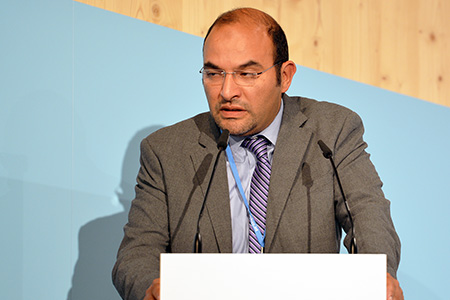31 March - 4 April 2019. Cairo. Land and Water Days in the NENA Region 2019 :
This session was organized by ICARDA, IWMI, IOM, and FAO, and demonstrated how accessing
and using information, knowledge and data management of the use of water resources for agriculture can help to improve technologies and practices to meet the challenges of water scarcity and food security in the dry areas, including related issues such as forced displacement and migration.
 There is a lot that can be gleaned from the knowledge behind traditional interventions, which can help produce innovative solutions. This is especially true in the field of water management and agriculture.
There is a lot that can be gleaned from the knowledge behind traditional interventions, which can help produce innovative solutions. This is especially true in the field of water management and agriculture.
3 April 2019. Water scarcity from options to actions what does it take? Collective intelligence, information and research
This session addressed common goals and support institutions working in water and agricultural sectors, so they can improve the livelihoods of the resource-poor in dry areas. This can be undertaken by enhancing food and nutrition security, conserving natural resources, and supporting the effective management of water scarcity through research and partnerships to achieve sustainable increases in agricultural productivity and income, while ensuring the more efficient and equitable use of ecosystem services.This session was organized by ICARDA, IWMI, IOM, and FAO, and demonstrated how accessing
and using information, knowledge and data management of the use of water resources for agriculture can help to improve technologies and practices to meet the challenges of water scarcity and food security in the dry areas, including related issues such as forced displacement and migration.
 There is a lot that can be gleaned from the knowledge behind traditional interventions, which can help produce innovative solutions. This is especially true in the field of water management and agriculture.
There is a lot that can be gleaned from the knowledge behind traditional interventions, which can help produce innovative solutions. This is especially true in the field of water management and agriculture.- Atef Swalem (see picture)- moderator ICARDA
"Big data should help farmers to decide what crop to cultivate and when " - Awni Kloub, Ministry of Water Resources, Jordan - Smart applications to manage water
resources in light of the scarcity of water in Jordan - Olga Aymerich Iraq mission, IOM - Assessing Displacement Risk related to water crisis in Southern and Central Iraq
- Chandrashekhar Biradar (see picture), ICARDA - Big Data and Big picture in water management
Because data is growing exponentially it demands new technical and strategic approaches to untap it's huge potential - Jippe Hoogeveen, FAO - Monitoring land and water productivity by remote sensing
- Rachid Moussadek (see picture) - Institut National de Recherche Agronomique (INRA Morocco)
 "We need to understand why we develop big data. In Morocco we don't use big data to control farmers like in Jordan, but we want to give info to the farmer to understand how much water he needs on a specific day. That is where they beed big data! Any data in combination makes big data."Farmers are willing to pay for the South Moroccan Early Warning System for Irrigation, and this makes it sustainable."
"We need to understand why we develop big data. In Morocco we don't use big data to control farmers like in Jordan, but we want to give info to the farmer to understand how much water he needs on a specific day. That is where they beed big data! Any data in combination makes big data."Farmers are willing to pay for the South Moroccan Early Warning System for Irrigation, and this makes it sustainable."
"It is important to link the communicated data to market incentives: "if you irrigate less you will earn ☆☆☆ $$$ USD" - Dr Mohamed Rami - Director Environment and Climate Change Reserch Institute Egypt, respondent
- Dr Bezaiet Dessalegn (Social Science Specialist ICARDA), respondent



No comments:
Post a Comment